Overview
CRM software encompasses a suite of solutions aimed at optimizing how businesses engage with clients. By centralizing client information, it enhances relationship management and facilitates data-driven decision-making. This is crucial for businesses, as effective CRM can lead to:
- Improved client satisfaction
- Operational efficiency
- Sales performance
Furthermore, it is essential to recognize the challenges associated with user adoption and the necessity of comprehensive training for successful implementation. Addressing these aspects builds a reliable framework for understanding the value of CRM software in today's business landscape.
Introduction
In the dynamic world of business, effective customer relationship management has become a cornerstone for success. Many organizations share a common concern regarding how to foster deeper connections with their clientele. As companies strive to address this, CRM software emerges as a powerful ally, streamlining interactions and centralizing vital customer data.
Furthermore, with the global market for CRM solutions projected to soar, understanding the various types, features, and benefits of these systems is essential for organizations looking to thrive in a competitive landscape. This means that comprehending these solutions can significantly enhance customer engagement strategies.
However, the path to successful CRM implementation is fraught with challenges, from user resistance to data quality concerns. By exploring best practices and addressing common pitfalls, businesses can unlock the full potential of CRM software, transforming their approach to customer engagement and driving sustainable growth.
Therefore, it is crucial for organizations to consider how CRM solutions can support their goals and improve their customer relationships.
Understanding CRM Software: Definition and Purpose
To define CRM software, it pertains to a collection of solutions aimed at optimizing how companies engage with both existing and potential clients. By centralizing client information, CRM solutions enable organizations to monitor interactions, assess client behavior, and ultimately improve relationships. This fundamental comprehension is crucial for companies seeking to define CRM software solutions efficiently, especially in today's competitive environment.
In 2025, the significance of CRM solutions cannot be emphasized enough. They serve as essential tools for managing client relationships, with studies indicating that 37% of small businesses express high satisfaction with their CRM systems. This satisfaction is often associated with the capability of CRM software to deliver insights that enhance better decision-making and cultivate stronger connections.
Furthermore, the platform emphasizes security, having passed assessments to ensure user data protection, which is crucial for maintaining precise client records. However, the journey to successful CRM implementation is not without its challenges. A significant case study highlights that less than 40% of companies fully implement their CRM systems, primarily due to inadequate training and user support.
As Nick Rockwell, Content Marketing Manager, notes, about 83% of senior executives reported that they’ve met with reluctance and had to continuously encourage staff members to incorporate CRM software into their daily tasks. These barriers can lead to issues such as manual data entry and difficulties in tool integration, which hinder adoption rates. Tackling these challenges is essential for organizations to achieve the full potential of their CRM investments.
Current trends in the CRM sector indicate a rising acknowledgment of the need to define CRM software's role in improving relationship management. As companies increasingly depend on data-driven strategies, the capability to evaluate client interactions and preferences becomes essential. Expert views emphasize that efficient CRM solutions not only enhance client satisfaction but also promote revenue increase by facilitating personalized marketing and sales approaches.
In conclusion, to define CRM software in 2025, it is characterized by its goal to improve client relationships through centralized data management and insightful analytics. As enterprises maneuver through the intricacies of client interaction, the effective execution of CRM solutions will be a crucial differentiator in attaining lasting success.
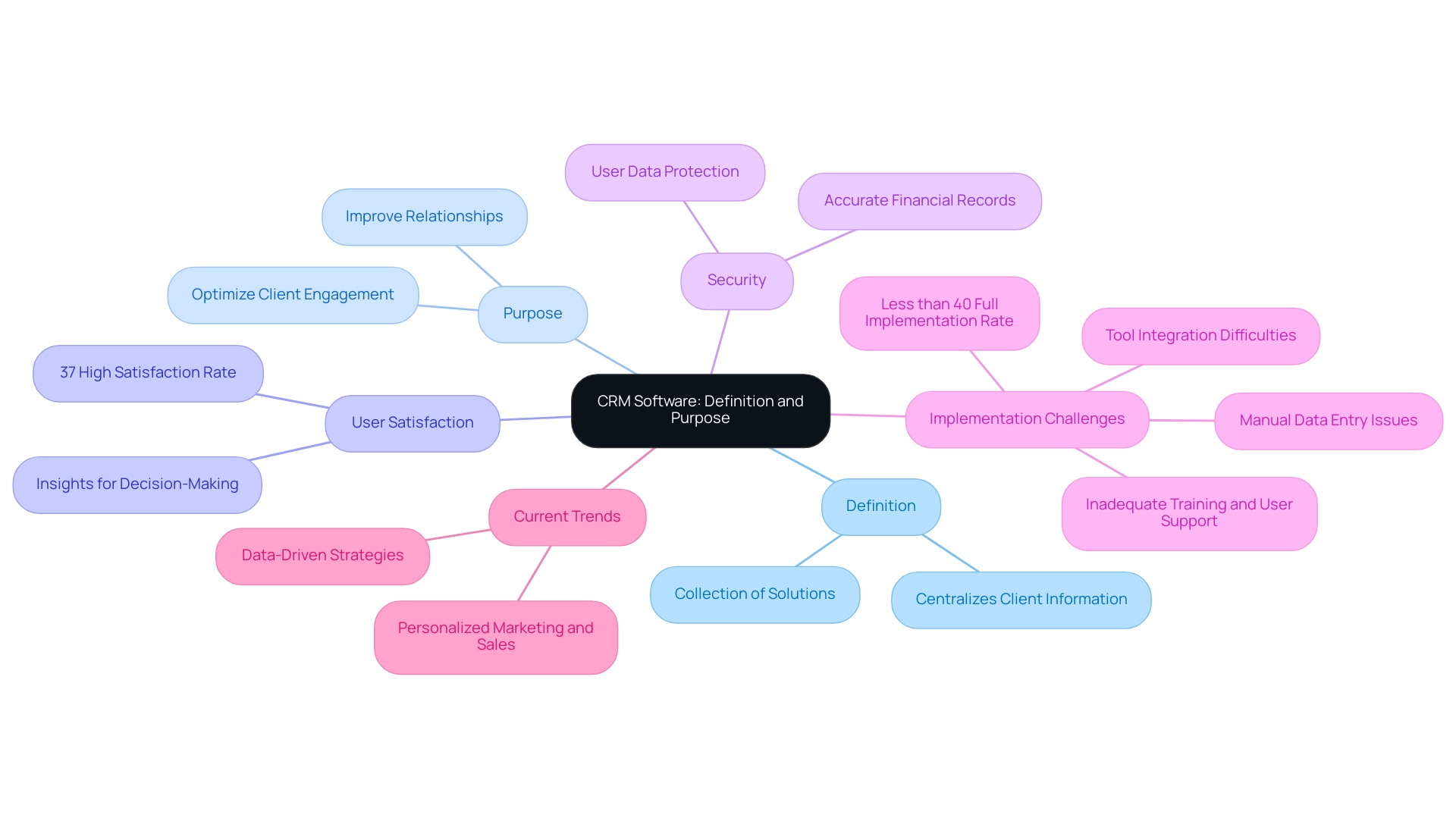
Exploring Different Types of CRM Systems
CRM platforms can be classified into three main types: Operational, Analytical, and Collaborative CRMs, each fulfilling unique roles that address different organizational requirements.
Operational CRMs are designed to optimize client-facing processes, such as sales, marketing, and support. By automating these functions, enterprises enhance efficiency and improve client interactions, ultimately driving sales growth. Statistics indicate that 85% of CRM users in the U.S. mention enhanced client experience as the main advantage of using these platforms. This highlights the significance of Operational CRMs in boosting client satisfaction.
Analytical CRMs focus on the examination of client data to guide strategic decision-making. These frameworks allow companies to gain insights into consumer behavior, preferences, and trends, facilitating more targeted marketing initiatives and improved client retention strategies. Ljubomir Lukic, Director of Ecommerce Development at Digital Silk, emphasizes the importance of leveraging data insights to refine marketing strategies, which is crucial for organizations aiming to thrive in competitive markets.
Collaborative CRMs enhance communication and collaboration across different departments within an organization. By breaking down barriers, these frameworks ensure that all teams have access to the same client information, promoting a cohesive approach to client interaction and service provision. This is particularly beneficial for freelancers and small business owners who often juggle various roles and require seamless communication to improve their operations.
Understanding the intricacies of these CRM types is essential for organizations aiming to select software that aligns with their operational needs and enhances customer engagement strategies. Current market trends indicate a growing preference for these solutions, with the global CRM market projected to reach $80 billion by 2025, reflecting a year-on-year growth rate of 12.6%. This growth underscores the increasing importance of CRM systems in optimizing operations.
Case studies illustrate the practical applications of these CRM types. For example, businesses that have implemented Operational CRMs report improved sales processes and heightened client satisfaction. Conversely, those utilizing Analytical CRMs have harnessed data insights to refine their marketing strategies, resulting in increased client loyalty.
Collaborative CRMs have proven advantageous for organizations looking to enhance interdepartmental communication, leading to a more unified customer experience. The Kulud Expense Management Platform serves as a pertinent example, demonstrating how CRM solutions can streamline operations for freelancers and small business owners by automating expense management through features like automated receipt capture, bank transaction matching, and straightforward accounting exports. Users can log in with their work email, capture invoices and receipts, and select date ranges or activate automatic search, simplifying financial management without manual sorting or downloads.
This not only streamlines financial processes but also improves communication with accountants, making it an invaluable tool for effective management.
As we move further into 2025, the landscape of CRM systems continues to evolve, with organizations increasingly recognizing the value of tailored solutions like Kulud that meet their specific operational needs.
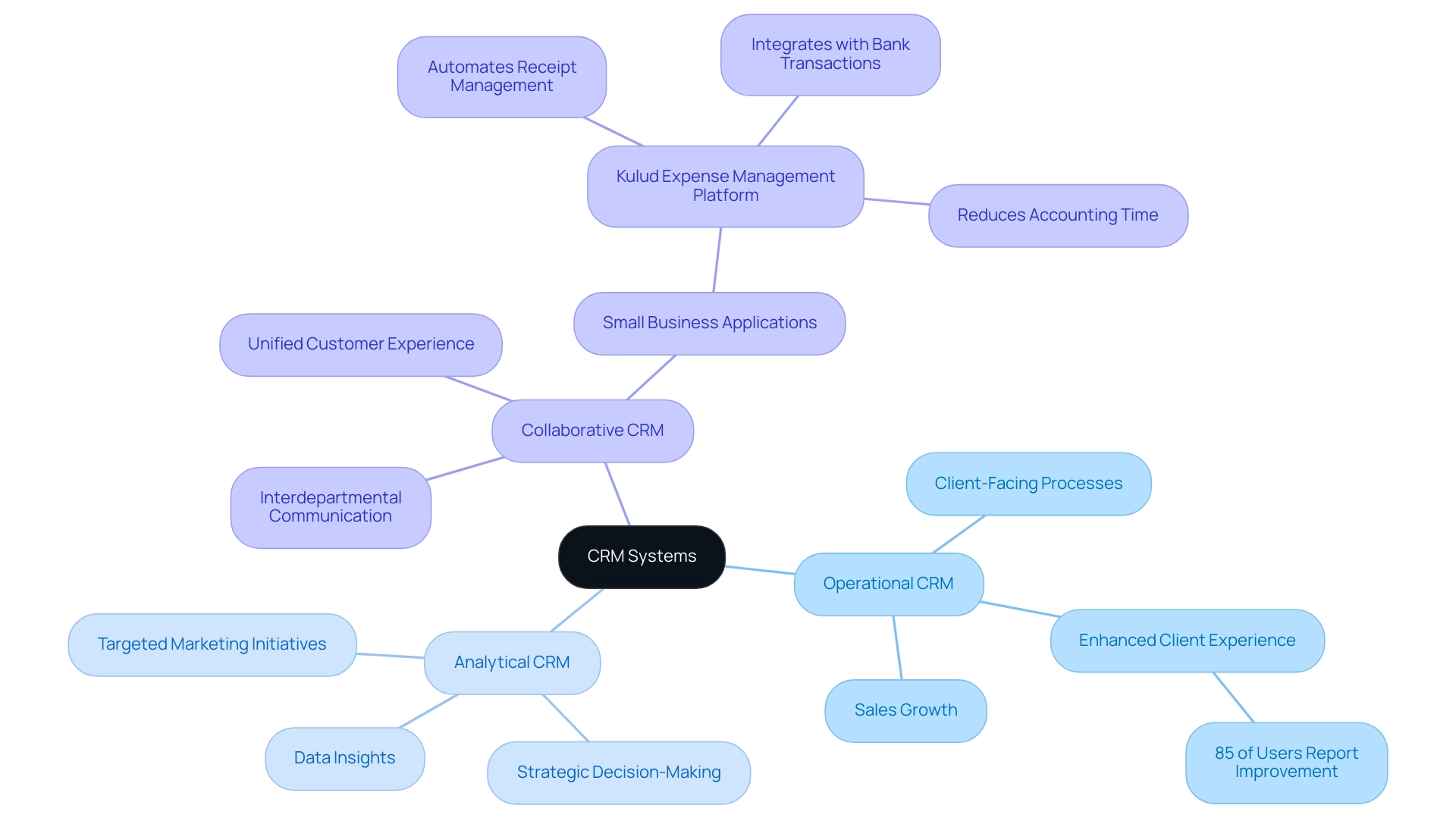
Key Features to Look for in CRM Software
When choosing a CRM, freelancers and small enterprise owners should prioritize essential features that enhance operational efficiency and relationship management. Understanding the key features of CRM software is crucial for making informed decisions.
-
Contact Management is vital for organizing and maintaining customer information. This feature allows businesses to track interactions and manage relationships effectively. Companies that excel in contact management often report enhanced client satisfaction and retention rates. Notably, 91% of companies with 11 or more employees utilize CRM software, which underscores the importance of CRM adoption in managing client relationships.
-
Sales Automation plays a significant role in streamlining the sales process, maximizing productivity. Sales automation tools assist sales teams in managing leads, automating follow-ups, and closing deals more efficiently. Interestingly, 70% of sales representatives trust CRM solutions to help close more deals, reinforcing CRM software as an effective tool.
-
Reporting and Analytics provide valuable insights into client behavior and sales performance. This data-driven approach enables organizations to make informed decisions, optimize strategies, and ultimately drive growth. In fact, 32% of CRM usage is dedicated to generating new leads and improving customer satisfaction through these insights.
-
Integration Capabilities are essential for a cohesive workflow. A CRM's ability to integrate seamlessly with other tools and software ensures that companies can leverage existing systems, enhancing overall productivity. For example, the implementation of mobile CRM has been shown to boost on-site productivity by up to 50%, highlighting the importance of integration in contemporary organizational environments.
As we look towards 2025, companies should consider how to define CRM software in light of the evolving landscape. The global market was valued at $91.43 billion in 2023 and is projected to grow significantly, reaching between $101.41 billion and $262.74 billion. This growth emphasizes the need to understand how to define CRM software to manage client relationships effectively. As Julie Abecassis, a Customer Success Manager, notes, "The right CRM can transform how freelancers manage their client interactions and streamline their processes."
By focusing on these key features, freelancers can select a CRM that not only meets their current needs but also supports future growth and success.
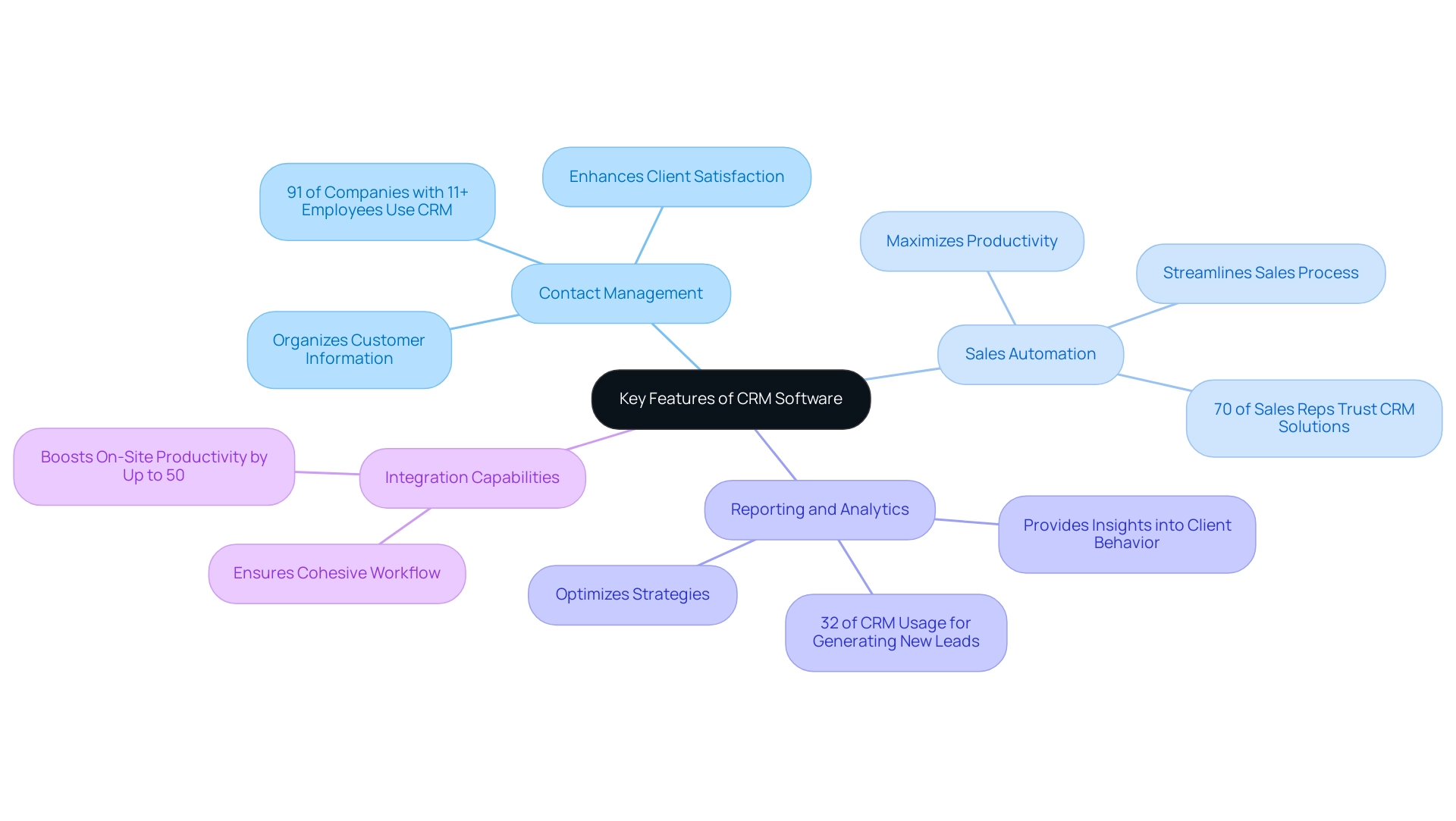
Benefits of Implementing CRM Software for Businesses
To define CRM software, it is essential to acknowledge the numerous benefits it offers businesses, particularly in enhancing service, boosting sales, and improving data organization. By centralizing client information, organizations can respond to inquiries with greater speed and precision, tailoring their services to meet individual needs more effectively. This capability is crucial, especially considering that only 28% of organizations express satisfaction with their current tools for creating a centralized customer view, underscoring the need to define CRM software as an effective solution.
Furthermore, CRM systems streamline operations by automating repetitive tasks, allowing employees to redirect their efforts toward strategic initiatives. This shift not only enhances productivity but also fosters an environment conducive to growth. For instance, companies that have adopted CRM solutions report significant improvements in service metrics, with many noting enhanced communication and satisfaction levels among clients.
In fact, a staggering 32% of sales representatives spend over an hour daily on manual data entry, which detracts from their efficiency—this is an issue we can address when we define CRM software.
Case studies illustrate how to define CRM software and its transformative effects on small businesses. Companies that have integrated these systems often experience a marked increase in client retention rates and sales figures, as they can leverage data insights to refine their marketing strategies and service offerings. For example, the Kulud Expense Management Platform has demonstrated how automation can drastically reduce the time spent on accounting tasks, transforming the bookkeeping process from hours to just minutes.
As Georgi Knyazhev, a freelancer, states, "Instead of spending 3 hours each month searching for and collecting invoices for my companies in Estonia, I now spend just 5 minutes. It's a huge time saver." This testimonial highlights the impact of automation, which parallels the benefits freelancers can gain from implementing CRM solutions.
In addition to this, Kulud offers functionalities such as automated receipt capture, bank transaction matching, and the ability to export reports in PDF format, further streamlining the expense management process. The platform has also successfully passed security assessments, ensuring a high level of data protection for its users.
As we move through 2025, the influence of CRM on service and sales remains significant, with expert opinions underscoring its role in enhancing efficiency and effectiveness in interactions. In summary, when we define CRM software, we see that its implementation not only enhances customer service but also acts as a catalyst for increased sales and improved organizational efficiency, making it an indispensable tool for enterprises aiming to thrive in a competitive landscape.
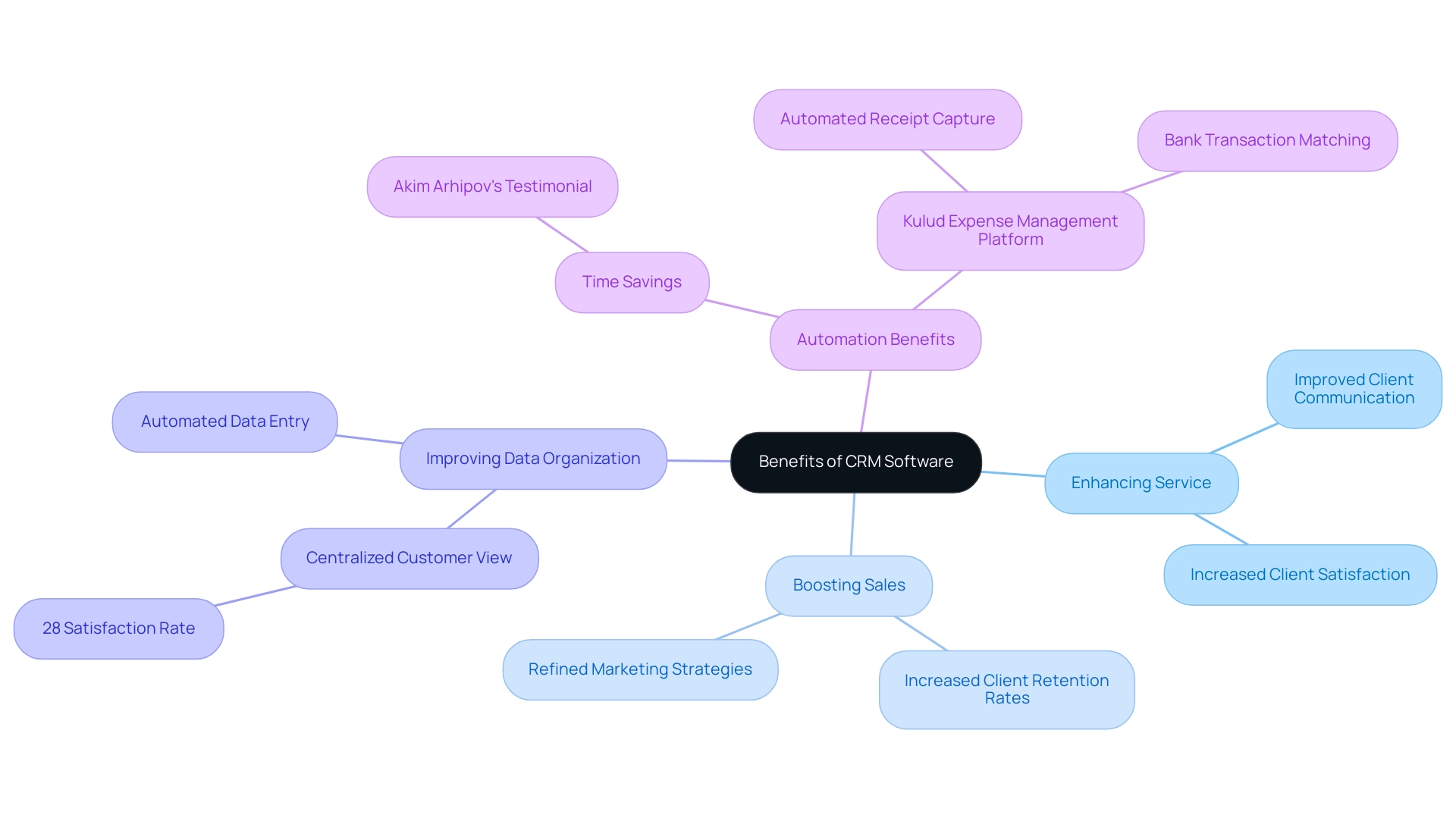
Challenges and Considerations in CRM Adoption
Despite the substantial advantages that CRM solutions can provide, businesses often face significant hurdles when defining CRM software during the adoption process. A primary challenge is user resistance, which can stem from a lack of understanding of the advantages or fear of change. In fact, recent statistics indicate that a notable percentage of organizations struggle with this resistance, highlighting the need for effective change management strategies.
Significantly, merely 28% of organizations feel satisfied with their tools for creating a centralized view of clients. This underscores the importance of seamless integration and user satisfaction. Data quality concerns also pose a challenge, as inaccurate or incomplete information can undermine the effectiveness of CRM systems. Furthermore, integration difficulties with existing tools can complicate the implementation process, leading to frustration among users. A 2025 survey revealed that only 28% of organizations felt satisfied with their tools for creating a centralized view of customers, emphasizing the critical need for seamless integration.
To address these challenges, businesses should prioritize comprehensive training programs that help users define CRM software and understand its functionalities and advantages. Ensuring data accuracy is crucial; organizations must establish protocols for maintaining high-quality data. Furthermore, choosing a CRM that works well with current setups can greatly facilitate the transition.
Case studies illustrate the importance of addressing these challenges. For example, the case study titled "Enhancing Consumer Experience with Customer Analytics" demonstrates how CRM platforms enhance client experiences. Notably, 85% of CRM users in the US indicate that improved client experience is the primary advantage of utilizing CRM. Small enterprises that implemented targeted training and integration strategies reported a marked improvement in user adoption rates and overall satisfaction with their CRM systems.
As Hinal Tanna, an SEO strategist and content marketer, notes, "Understanding the tools at your disposal is key to overcoming resistance and maximizing their potential." By proactively tackling these issues, organizations can enhance the likelihood of successful CRM implementation and ultimately define CRM software to improve customer relationships.
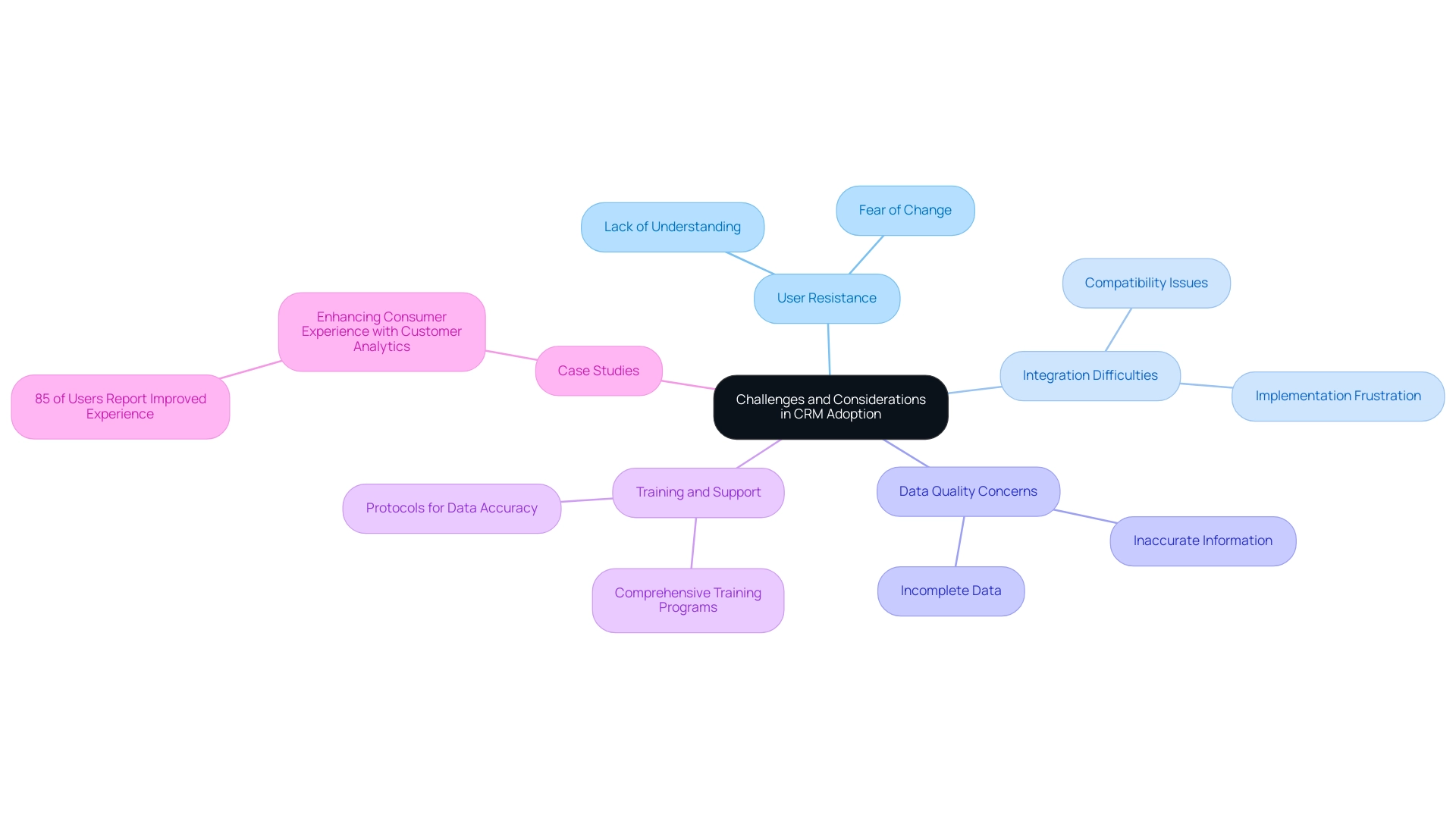
Best Practices for Choosing and Implementing CRM Software
To effectively define CRM software, organizations should adhere to several best practices that ensure a successful transition when choosing and implementing it. First, it is crucial to define CRM software in order to establish clear objectives that align with the organization's goals. This clarity helps in selecting a CRM that meets specific needs.
Involving stakeholders throughout the selection process fosters buy-in and ensures that the chosen system addresses the requirements of all users. Comprehensive training is another vital component, as it significantly impacts user adoption rates. Research indicates that 25% of organizations cite training and user adoption as significant challenges during CRM implementation. By investing in thorough training programs, organizations can enhance user confidence and proficiency, ultimately leading to higher satisfaction and utilization rates.
When assessing CRM options, companies should consider features, scalability, and user-friendliness. A user-friendly interface is particularly important, as only 7% of CRM users report tool complexity as a major issue. This implies that a well-structured framework can mitigate potential frustrations and facilitate smoother operations.
Once a CRM is selected, developing a detailed implementation plan is essential. This plan should outline timelines, responsibilities, and metrics for success, ensuring that all team members are aligned and accountable. Successful CRM implementations have been shown to achieve up to 42% greater accuracy in sales forecasting, underscoring the importance of a strategic approach.
By following these best practices, organizations can define CRM software to maximize its benefits, leading to improved efficiency and enhanced customer relationships. Case studies from industry leaders demonstrate that organizations that define their objectives clearly and engage in comprehensive training are more likely to experience transformative results when they define CRM software in their adoption journey. For instance, Georgi Knyazhev, a user of Kulud, stated, "Kulud has transformed my accounting processes, allowing me to save time and streamline communication with my accountants."
This emphasizes how effective tools like Kulud can simplify bookkeeping tasks through automated receipt capture and bank transaction matching, making them especially advantageous for freelancers and small enterprise owners.
To utilize Kulud effectively, users can:
- Log in with their professional email
- Capture invoices and receipts
- Connect their bank accounts
Kulud will automatically match invoices with transactions, ensuring a seamless experience. Additionally, Kulud has undergone a comprehensive security audit and has been validated by Google and the App Defense Alliance, reinforcing its commitment to data security.
Kulud's innovative platform exemplifies how automation can alleviate the burden of manual accounting, ensuring data security and allowing users to focus on growing their businesses.
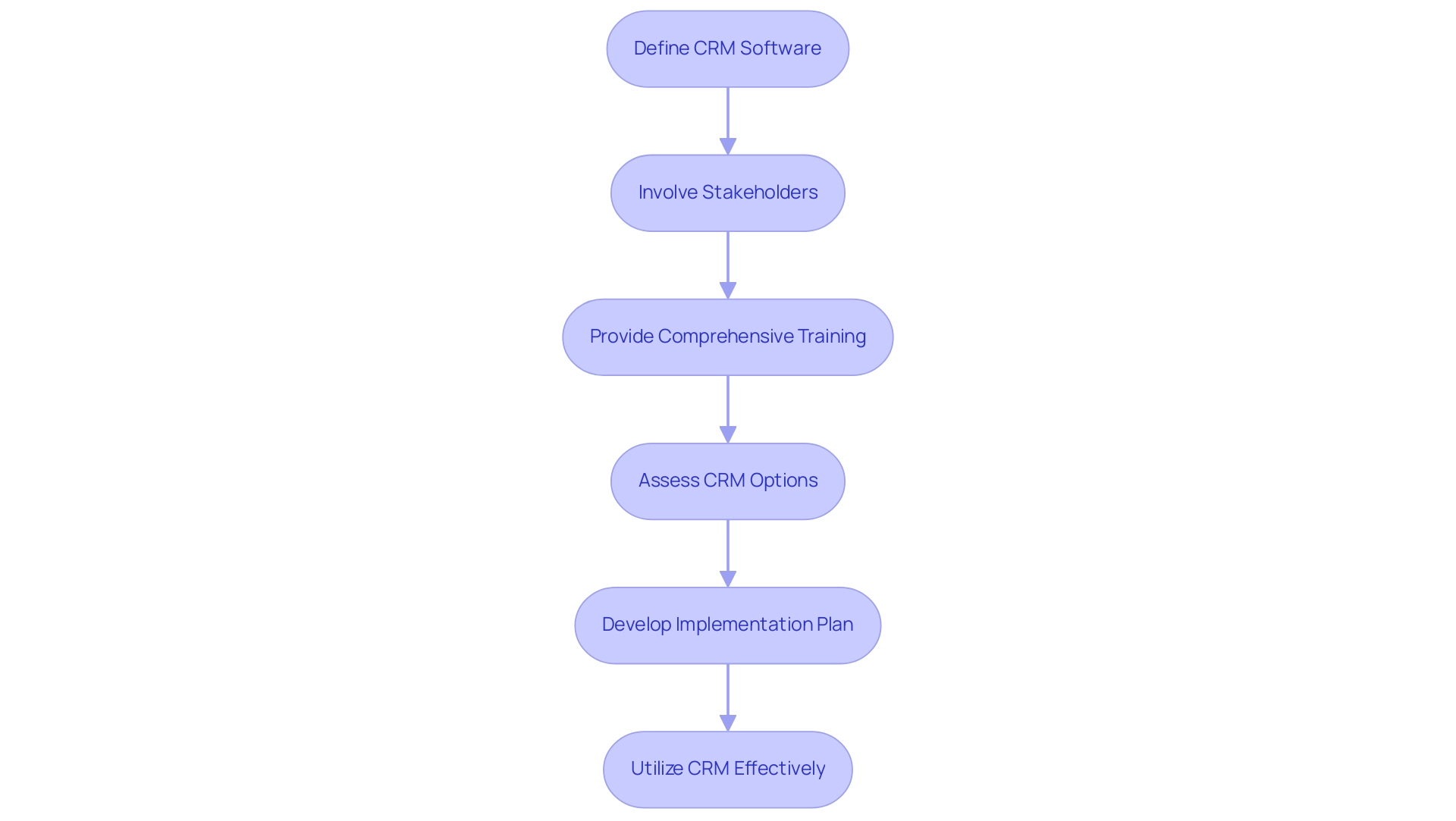
Conclusion
Implementing CRM software is not merely a trend; it is a strategic necessity for businesses aiming to improve customer relationships and drive growth. Organizations often face concerns about selecting the right CRM system. By understanding the various types—Operational, Analytical, and Collaborative—companies can choose solutions that align with their specific needs and enhance customer engagement. The key features of effective CRM software, including contact management, sales automation, and robust reporting capabilities, are vital for maximizing operational efficiency and improving customer service.
However, the journey to successful CRM implementation is often hindered by challenges such as user resistance and data quality issues. This means that addressing these obstacles through comprehensive training and seamless integration is crucial for fostering user adoption and ensuring the system's effectiveness. By adhering to best practices during the selection and implementation phases, businesses can unlock the full potential of their CRM systems, leading to increased customer satisfaction and loyalty.
As the global market for CRM solutions continues to expand, the importance of these systems in optimizing business operations cannot be overstated. Organizations that prioritize effective CRM strategies will not only enhance their customer interactions but also position themselves for sustainable growth in a competitive landscape. Ultimately, the thoughtful integration of CRM software can transform how businesses engage with their customers, paving the way for long-term success. We encourage businesses to consider their CRM needs carefully and explore solutions that can elevate their customer engagement strategies.



